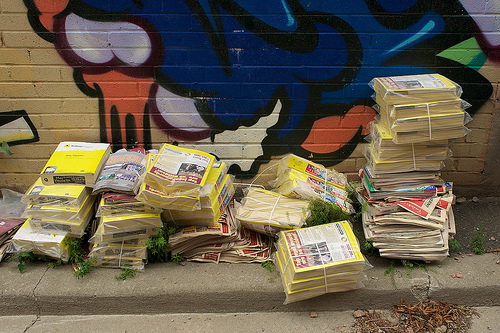It’s been almost two years since we first wrote about the minor plague of the white pages. Customers don’t use them and phone companies don’t want to distribute them. Although almost no one wanted more printed white pages, an outdated law in Washington required their delivery every fifteen months, like it or not.
It was a colossal waste, a perfect example of sustainability made illegal. It was absurd.
Last week, however, state regulators finally agreed to change the law.
No longer will state residents hear the annoying thud of unwanted white pages, and no longer will state law mandate pointless waste. Under the new regulations, phone companies are free to not deliver physical phone books. Since the telecoms already don’t want to print and deliver them in metropolitan areas, they won’t. In rural areas, where white and yellow page directories are typically co-bound and much slimmer, the phone companies will likely continue to deliver phone books, but they are now required to provide an “opt-out” mechanism for customers who want to avoid automatic delivery. Washington will now join at least 18 other states where white pages directories are not delivered by legal mandate.
It’s important to note that optional delivery will not be unfair to the poor or elderly. At Sightline’s urging, the state’s new regulations require phone companies to provide free printed directories to those who request them, and to make electronic directories available on the web. (And contrary to an oddball argument made by the state Attorney General’s office, optional white pages will not jeopardize public safety.)
Ending Washington’s regime of mandatory white pages may seem like a small thing, yet it is worth celebrating. It marks the end of a pointless waste of resources, a little less annoyance for state residents, and reduced public costs for waste management. It’s a great example of how we can make sustainability legal.
A few thanks are in order. Sightline’s Pam MacRae helped draft innumerable formal comments to state regulators, and Sightline’s board president Jeanette Henderson, a veteran of the yellow pages wars, slogged with us through a very long rule-making process. We were fortunate to be joined in our quest by the City of Seattle, particularly by Councilmember Mike O’Brien and his staff, and by Tim Croll, solid waste director at Seattle Public Utilities. Here is the City’s official statement on the new regulations.


Comments are closed.